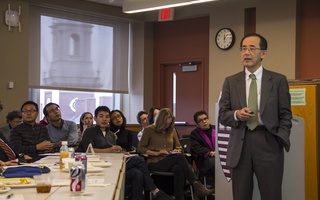
Yasutoshi Nishimura, Senior Vice-Minister of the Cabinet Office of Japan speaks about the current and future state of economics in Japan at the Harvard Kennedy School on Saturday.
Japan’s Senior Vice-Minister of the Cabinet Office Yasutoshi Nishimura emphasized the need to revitalize Japan’s stagnating economy and explained the different components of “Abenomics”—Japanese Prime Minister Shinzo Abe’s plan for economic revitalization—to Harvard affiliates Saturday afternoon.
According to Nishimura, decades of sluggish economic growth in Japan have generated a sense of stagnation in the country.
“Japanese economy and society have become introverted,” Nishimura said. “In the meantime, China and other emerging economies have developed economic powers and increased their presence in the world economy.”
As the prime minister’s cabinet member, Nishimura’s speech at the Harvard Kennedy School focused on the controversial economic reforms that have been implemented in Japan since Abe’s election one year ago. According to Nishimura, “Abenomics” is designed to “boost the metabolism” of domestic industry, globalize the Japanese economy, and stimulate domestic and foreign investment.
Nishimura pointed to the 3.8 percent real GDP growth rate for the April to June quarter this year as evidence of the effectiveness of reforms, which include an aggressive set of monetary, fiscal, and structural changes. So far, Japan’s central bank has implemented a large-scale quantitative easing program that aims to double the country’s monetary base in two years to pull the economy out of deflation.
However, according to Nishimura, economic revitalization will occur through private initiatives, not through the government.
“The role of the government, rather, is to create the proper environment for such initiatives,” he said.
To boost industry, the new administration plans to stimulate investment in emerging companies through corporate tax cuts to boost foreign investment and the establishment of national strategic zones to attract business projects.
“Abenomics” plans to combat Japan’s decreasing population and labor force participation rate by creating more opportunities for women in the workforce and drastically increasing the number of child care centers, according to Nishimura.
Nishimura also expressed his belief that “the deepening of the Japan and U.S. alliance in the growth sense will bring significant benefits in various areas such as economic development, peace, and stability in the world.” Japan’s economic resurgence, Nishimura said, would enable it to cooperate with the U.S. to improve global trade, foreign, and security policies.
In a question-and-answer session following the talk, one audience member asked about current Sino-Japanese relations. Nishimura chose to answer in Japanese with the help of an English translator.
“In terms of security issues, Japan is strongly against China trying to change the status quo with the use of force,” Nishimura said. “We need [China] to abide by international rules.” Nishimura said that Japan is always willing to engage in dialogue with China.
Despite Nishimura’s comprehensive overview of Japan’s new economic policies, some audience members said the speech was one-sided.
“Today’s speech was more along the lines of what the government’s policies are rather than a candid appraisal of what may or may not happen,” said John A. Shane, founder of the Japan Society of Boston, one of the sponsors of the event.
Read more in University News
With Space and Personnel at a Premium, SEAS To Increase Faculty by Nearly 30 PercentRecommended Articles
-
Speaker Stresses U.S. Role in AsiaThe U.S. ambassador to Japan emphasized yesterday the strong role that America will play in Asia in the coming century.
-
Nuclear Reality CheckRegardless of criticisms, the reality is that nuclear power is here to stay.
-
Scholars Examine Japan’s FutureThree Japanese visiting scholars presented their end-of-term findings after a yearlong research position at Harvard, addressing Japan’s trade, business, and food security landscape at a panel discussion yesterday in CGIS North.
-
 Former Bank of Japan Gov. Dispels Myths About Japanese Economy
Former Bank of Japan Gov. Dispels Myths About Japanese Economy -
Visiting Professor Discusses Japanese Space Program"I would put Japan squarely among the world’s top five space powers," University of Washington-Seattle Professor Saadia M. Pekkanen said.













